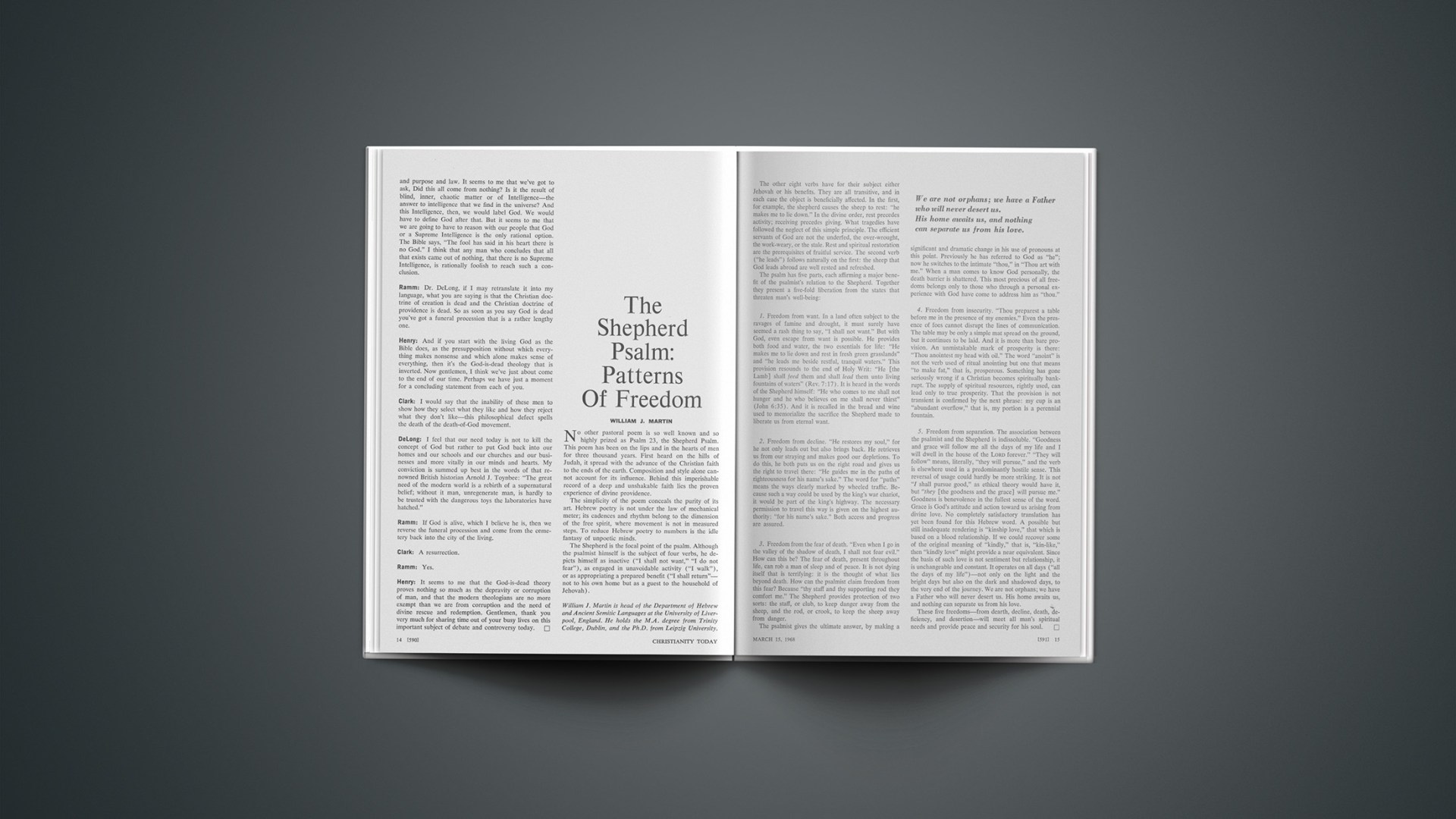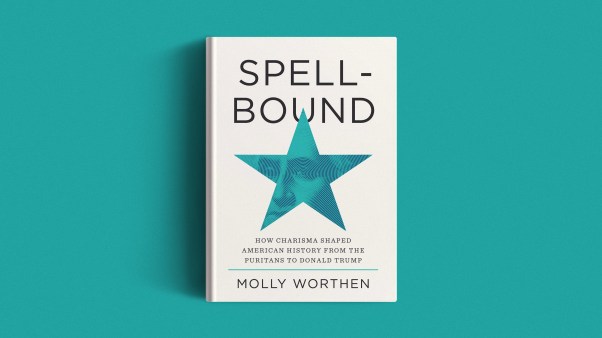No other pastoral poem is so well known and so highly prized as Psalm 23, the Shepherd Psalm. This poem has been on the lips and in the hearts of men for three thousand years. First heard on the hills of Judah, it spread with the advance of the Christian faith to the ends of the earth. Composition and style alone cannot account for its influence. Behind this imperishable record of a deep and unshakable faith lies the proven experience of divine providence.
The simplicity of the poem conceals the purity of its art. Hebrew poetry is not under the law of mechanical meter; its cadences and rhythm belong to the dimension of the free spirit, where movement is not in measured steps. To reduce Hebrew poetry to numbers is the idle fantasy of unpoetic minds.
The Shepherd is the focal point of the psalm. Although the psalmist himself is the subject of four verbs, he depicts himself as inactive (“I shall not want,” “I do not fear”), as engaged in unavoidable activity (“I walk”), or as appropriating a prepared benefit (“I shall return”—not to his own home but as a guest to the household of Jehovah).
The other eight verbs have for their subject either Jehovah or his benefits. They are all transitive, and in each case the object is beneficially affected. In the first, for example, the shepherd causes the sheep to rest: “he makes me to lie down.” In the divine order, rest precedes activity; receiving precedes giving. What tragedies have followed the neglect of this simple principle. The efficient servants of God are not the underfed, the over-wrought, the work-weary, or the stale. Rest and spiritual restoration are the prerequisites of fruitful service. The second verb (“he leads”) follows naturally on the first: the sheep that God leads abroad are well rested and refreshed.
The psalm has five parts, each affirming a major benefit of the psalmist’s relation to the Shepherd. Together they present a five-fold liberation from the states that threaten man’s well-being:
1. Freedom from want. In a land often subject to the ravages of famine and drought, it must surely have seemed a rash thing to say, “I shall not want.” But with God, even escape from want is possible. He provides both food and water, the two essentials for life: “He makes me to lie down and rest in fresh green grasslands” and “he leads me beside restful, tranquil waters.” This provision resounds to the end of Holy Writ: “He [the Lamb] shall feed them and shall lead them unto living fountains of waters” (Rev. 7:17). It is heard in the words of the Shepherd himself: “He who comes to me shall not hunger and he who believes on me shall never thirst” (John 6:35). And it is recalled in the bread and wine used to memorialize the sacrifice the Shepherd made to liberate us from eternal want.
2. Freedom from decline. “He restores my soul,” for he not only leads out but also brings back. He retrieves us from our straying and makes good our depletions. To do this, he both puts us on the right road and gives us the right to travel there: “He guides me in the paths of righteousness for his name’s sake.” The word for “paths” means the ways clearly marked by wheeled traffic. Because such a way could be used by the king’s war chariot, it would be part of the king’s highway. The necessary permission to travel this way is given on the highest authority: “for his name’s sake.” Both access and progress are assured.
3. Freedom from the fear of death. “Even when I go in the valley of the shadow of death, I shall not fear evil.” How can this be? The fear of death, present throughout life, can rob a man of sleep and of peace. It is not dying itself that is terrifying: it is the thought of what lies beyond death. How can the psalmist claim freedom from this fear? Because “thy staff and thy supporting rod they comfort me.” The Shepherd provides protection of two sorts: the staff, or club, to keep danger away from the sheep, and the rod, or crook, to keep the sheep away from danger.
The psalmist gives the ultimate answer, by making a significant and dramatic change in his use of pronouns at this point. Previously he has referred to God as “he”; now he switches to the intimate “thou,” in “Thou art with me.” When a man comes to know God personally, the death barrier is shattered. This most precious of all freedoms belongs only to those who through a personal experience with God have come to address him as “thou.”
4. Freedom from insecurity. “Thou preparest a table before me in the presence of my enemies.” Even the presence of foes cannot disrupt the lines of communication. The table may be only a simple mat spread on the ground, but it continues to be laid. And it is more than bare provision. An unmistakable mark of prosperity is there: “Thou anointest my head with oil.” The word “anoint” is not the verb used of ritual anointing but one that means “to make fat,” that is, prosperous. Something has gone seriously wrong if a Christian becomes spiritually bankrupt. The supply of spiritual resources, rightly used, can lead only to true prosperity. That the provision is not transient is confirmed by the next phrase: my cup is an “abundant overflow,” that is, my portion is a perennial fountain.
5. Freedom from separation. The association between the psalmist and the Shepherd is indissoluble. “Goodness and grace will follow me all the days of my life and I will dwell in the house of the LORD forever.” “They will follow” means, literally, “they will pursue,” and the verb is elsewhere used in a predominantly hostile sense. This reversal of usage could hardly be more striking. It is not “I shall pursue good,” as ethical theory would have it, but “they [the goodness and the grace] will pursue me.” Goodness is benevolence in the fullest sense of the word. Grace is God’s attitude and action toward us arising from divine love. No completely satisfactory translation has yet been found for this Hebrew word. A possible but still inadequate rendering is “kinship love,” that which is based on a blood relationship. If we could recover some of the original meaning of “kindly,” that is, “kin-like,” then “kindly love” might provide a near equivalent. Since the basis of such love is not sentiment but relationship, it is unchangeable and constant. It operates on all days (“all the days of my life”)—not only on the light and the bright days but also on the dark and shadowed days, to the very end of the journey. We are not orphans; we have a Father who will never desert us. His home awaits us, and nothing can separate us from his love.
These five freedoms—from dearth, decline, death, deficiency, and desertion—will meet all man’s spiritual needs and provide peace and security for his soul.
Milton D. Hunnex is professor and head of the department of philosophy at Willamette University, Salem, Oregon. He received the B.A. and M.A. degrees from the University of Redlands and the Ph.D. in the Inter-collegiate Program in Graduate Studies, Claremont, California. He is author of “Philosophies and Philosophers.”










